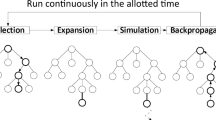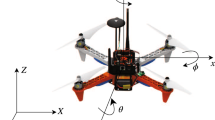Abstract
We consider a problem domain where coalitions of agents are formed in order to execute tasks. Each task is assigned at most one coalition of agents, and the coalition can be reorganized during execution. Executing a task means bringing it to one of the desired terminal states, which might take several time steps. The state of the task evolves even if no coalition is assigned to its execution and depends nondeterministically on the cumulative actions of the agents in the coalition. Furthermore, we assume that the reward obtained for executing a task evolves in time: the more the execution of the task is delayed, the lesser the reward. A representative example of this class of problems is the allocation of firefighters to fires in a disaster rescue environment. We describe a practical methodology through which a problem of this class can be encoded as a Markov Decision Process. Due to the three levels of factoring in the resulting MDP (the states, actions and rewards are composites of the original features of the problem) the resulting MDP can be directly solved only for small problem instances. We describe two methods for parallel decomposition of the MDP: the MDP RSUA approach for random sampling and uniform allocation and the MDP REUSE method which reuses the lower level MDP to allocate resources to the parallel subproblems. Through an experimental study which models the problem domain using the fire simulation components of the Robocup Rescue simulator, we show that both methods significantly outperform heuristic approaches and MDP REUSE provides an overall higher performance than MDP RSUA.
Similar content being viewed by others
References
Ågotnes, T., van der Hoek, W., & Wooldridge, M. (2006a). On the logic of coalitional games. In: 5th International joint conference on autonomous agents and multiagent systems (AAMAS 2006), Hakodate, Japan, May 8–12, 2006, pp. 153–160.
Ågotnes, T., van der Hoek, W., & Wooldridge, M. (2006b). Temporal qualitative coalitional games. In: 5th International joint conference on autonomous agents and multiagent systems (AAMAS 2006), Hakodate, Japan, May 8–12, 2006, pp. 177–184.
Bölöni, L., & Turgut, D. (2005). YAES—a modular simulator for mobile networks. In: Proceedings of the 8-th ACM/IEEE international symposium on modeling, analysis and simulation of wireless and mobile systems MSWIM 2005.
Boutilier C., Dean T., Hanks S. (1999) Decision-theoretic planning: Structural assumptions and computational leverage. Journal of Artificial Intelligence Research 11(1): 94
Chalkiadakis, G., & Boutilier, C. (2004). Bayesian reinforcement learning for coalition formation under uncertainty. In: Proceedings of the Third international joint conference on autonomous agents and multiagent systems, Vol. 3, pp. 1090–1097.
Chalkiadakis, G., & Boutilier, C. (2008). Sequential decision making in repeated coalition formation under uncertainty. In: Proceedings of the 7th international joint conference on Autonomous agents and multiagent systems. International Foundation for Autonomous Agents and Multiagent Systems, Vol. 1, pp. 347–354.
Ebden, M., Briers, M., & Roberts, S. (2008). Decentralized predictive sensor allocation. In: 47th IEEE Conference on decision and control, 2008. CDC 2008, pp. 1702–1707.
Goranko, V. (2001). Coalition games and alternating temporal logics. In: TARK ’01: Proceedings of the 8th conference on theoretical aspects of rationality and knowledge, pp. 259–272.
Guestrin C., Koller D., Parr R. (2002) Multiagent planning with factored MDPs. Advances in Neural Information Processing Systems 2: 1523–1530
Guestrin C., Koller D., Parr R., Venkataraman S. (2003) Efficient solution algorithms for factored MDPs. Journal of Artificial Intelligence Research 19(10): 399–468
van der Hoek W., Wooldridge M. (2005) On the logic of cooperation and propositional control. Artif Intell 164(1–2): 81–119
Khan, M., Turgut, D., & Bölöni, L. (2008). Optimizing coalition formation for tasks with dynamically evolving rewards and nondeterministic action effects. In: Proceedings of international workshop on optimisation in multi-agent systems (OptMas08), in conjunction with the seventh joint conference on autonomous and multi-agent systems (AAMAS 2008), pp. 69–76.
Klusch M., Gerber A. (2002) Dynamic coalition formation among rational agents. Intelligent Systems 17(3): 42–47
Meuleau, N., Hauskrecht, M., Kim, K., Peshkin, L., Kaelbling, L. P., Dean, T., et al. (1998). Solving very large weakly coupled markov decision processes. In: Proceedings of the fifteenth national conference on artificial intelligence, pp. 165–172.
Nüssle, T. A., Kleiner, A., & Brenner, M. (2004). Approaching urban disaster reality: The resQ firesimulator. In: Nardi D, Riedmiller M, Sammut C, Santos-Victor J (Eds.), RoboCup 2004: Robot Soccer World Cup VIII, Springer, Lecture Notes in Computer Science, Vol. 3276, pp. 474–482.
Osborne M., Rubinstein A. (1994) A Course in Game Theory. MIT Press.
Shehory O., Kraus S. (1998) Methods for task allocation via agent coalition formation. Artificial Intelligence 101(1–2): 165–200
Suijs J., Borm P., Waegenaere AD., Tijs S. (1999) Cooperative games with stochastic payoffs. European Journal of Operational Research 113(1): 193–205
Author information
Authors and Affiliations
Corresponding author
Rights and permissions
About this article
Cite this article
Khan, M.A., Turgut, D. & Bölöni, L. Optimizing coalition formation for tasks with dynamically evolving rewards and nondeterministic action effects. Auton Agent Multi-Agent Syst 22, 415–438 (2011). https://doi.org/10.1007/s10458-010-9134-5
Published:
Issue Date:
DOI: https://doi.org/10.1007/s10458-010-9134-5




